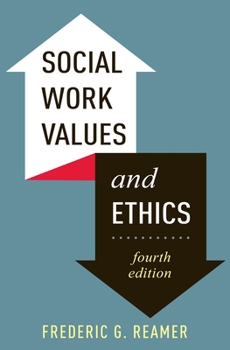Social Work Values and Ethics
(Part of the Foundations of Social Work Knowledge Series Series)
Select Format
Select Condition 
Book Overview
For more than a decade, teachers and practitioners have turned to Frederic G. Reamer's Social Work Values and Ethics for its comprehensive introduction to ethical decision making and practical guidance regarding professional misconduct. This new edition incorporates the legal and technological realities now facing individuals in the field, featuring a discussion of the ethical issues that arise from practitioner use of online services and...
Format:Paperback
Language:English
ISBN:0231161891
ISBN13:9780231161893
Release Date:July 2013
Publisher:Columbia University Press
Length:352 Pages
Weight:0.85 lbs.
Dimensions:0.6" x 6.0" x 8.9"
Grade Range:Postsecondary and higher
Customer Reviews
3 ratings
Social Work Values and Ethics
Published by Thriftbooks.com User , 17 years ago
Excellent overview of current thinking on the profession's ethics; will be useful in decision's about many thorny areas.
A valuable educational manual for students and professionals in the complex and changing field
Published by Thriftbooks.com User , 18 years ago
Now in an updated third edition, Social Work Values And Ethics by Frederic G. Reamer (Professor of Social Work, Rhode Island College) is an articulate and thoughtful introduction to core ethical principles and common dilemmas in the field of social work. Chapters cover common ethical issues in direct practice and indirect practice, as well as problems in ethical risk management and ethical misconduct. Chapters are followed by "discussion questions" ideal for group study and participation. A valuable educational manual for students and professionals in the complex and changing field.
Leading text, but could be improved
Published by Thriftbooks.com User , 22 years ago
The strongest advantage to this book is that it is written by one who was intimately involved in the development of the various codes of ethics adopted by social workers over the last thirty years. When Reamer explains a principle, value, or rule, the reader gets the feeling that it is an inside peak into the thought processes the committees actually shared.Reamer presents social work as a value-laden profession. In chapter one he shares a brief historical perspective on the profession, and places the development of ethical codes for social workers within a larger national context that includes erosion of confidence in authority figures and scientific explanations. The second chapter provides an excellent discussion of values and their importance to the profession, and it reconsiders the historical roots as a conflict between "case" social work and "cause" social work. His summary of the six orientations that have been taken toward social work is excellent. This chapter includes a long listing of various taxonomies of social work values. While of interest historically, it seemed a bit out of place and somewhat peripheral to the primary focus of the book, that is, the preparation of social workers for practice. It closes with discussion of the inevitable conflict between personal and professional values, and points to the implications of trust and distributive justice as effective means to resolve the conflict.Ethical dilemmas and decision making are the focus of chapter three. Once again Reamer adds to his historical summary, including additional material on the development of social work codes of ethics. By this point the reader will be convinced that Reamer should have included one good chapter of history so that the three historical streams in the first three chapters could have been presented as one. He also discusses the NASW Code (1996) in detail, but this is best utilized by those who are updating their knowledge from an earlier code. Entry-level social workers do not really need to know how the code has changed, as much as they need to know the current text.In the second half of chapter three, Reamer takes a more philosophical slant that tends to rely heavily on utilitarianism and on John Rawls' distributive justice. Reamer also presents his schema for resolving ethical conflict. This section is weak in two respects. First, Lowenberg and Dolgoff's ethical principles screen is not included in the discussion. Secondly, I feel that Reamer fails to address contemporary pressures, both political and religious, toward recognition and adoption of an absolutist approach to ethics. Chapters four and five are application chapters in which Reamer guides discussion of a variety of ethical conflicts that have been and will be faced by practitioners. An argument could be made that these chapters represent the strength of the book. Reamer concludes with a final chapter on malpractice and the entire NASW code (1996) in an appendix.Instr






